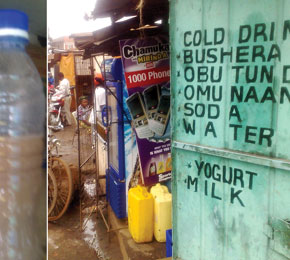
By Onghwens Kisangala
As value addition fad gets new meaning
Until now bushera, a non-alcoholic porridge with roots in western Uganda that is brewed from millet, sorghum and water, has been a beverage of the lower market spectrum. It has been served chilled mainly in dinghy village shops and city alleys.
Among the up-market crowd, bushera, has remained popular “” but only if made at home “” because of concerns over hygiene in its preparation. Sensing a potential market, especially among the growing middle class (who are increasingly demanding ready to go meals) and Ugandans in the Diaspora (who long for any Ugandan foods), Mr Peter Njawuzi hit on a smart idea “” canning bushera.
Today, courtesy of Njawuzi’s company, MultiLine, bushera graces the shelves of up-market shops in most posh city suburbs and even Uganda’s most plush shopping centre, the Garden City shopping mall in the heart of Kampala city.
Branded as “Bessa”, the redish-brown bushera cans look and feel exactly like the cans of Coca-Cola, Heineken, or Carlsberg in terms of shape and size.
Njawuzi, who is the director of MultiLine, says their plant in Masaka currently produces just enough to test the market.
Njawuzi explains that the cans are designed and produced in Egypt and shipped to Uganda for filling and sealing in a processing procedure where hygiene is the mantra for quality assurance. To ensure acceptability among sugar level watchers, for example, honey is used instead.
The quality, however, comes at a price, Shs 1,500 or the equivalent of the price of two bottles of Coke.
“People like it, mainly the westerners,” says a worker in the Supply and Sales department of Uchumi in the Garden City Mall. But the first and only batch supplied so far has stayed on shelves for three months. According to the staff “its sales have not picked up yet.”
But Njawuzi remains unfazed.
“We aim to optimise production capacity of the plant to 500 cartons per day,” he says.
Bushera is one of many agricultural products that are being processed to attain quality for higher market value and particularly export potential. The milk industry has grown from fresh milk packaging to powder form. There is an aggressive campaign for matooke (banana) that is to be processed into powder form.
The business minds behind these ventures hope peoples’ consumption behaviour regarding popular traditional dishes will change.
According to Dr. Bahati Joseph the Deputy Director at the Presidential Initiative on Banana Industrial Development (PIBID), the research and testing for consumption and market potential of banana flour is complete. The processing plant is to be established in Bushenyi district and machinery is ready.
But Mr. Mwendya Augustine, the Director Agri-business Development at Uganda National Farmers Federation fears the case of food scarcity may only increase. He says with Kenya and South Sudanese market already offering high prices for agro products, the likely high price offers of bushera and banana flour producers “will only worsen the already bad situation”.
He laments the lack of proper statistics to guide production, consumption and marketing of agro-produce in the country.
“We need realistic statistics regarding the level of production of different commodities so as to be able to ascertain what we need to sustain the domestic consumption and industrial processing and even export,” he says.
While opening the powder milk processing plant in May, President Yoweri Museveni said milk production in the country is in abundance. However, Mwendya disputes this saying in his Budaka area and the wider former Bukedi region milk is increasingly becoming a luxury. He says there is no researched statistical evidence to back up the president’s position.
“It is primarily very important,” Mwendya concludes, “that if these problems are going to be avoided, a methodology and due process is to be established for carrying out research about agricultural production capacity, supply and consumption in Uganda.” This will provide good grounds for better planning and policy formulation. Until then, residents of the up-market city suburbs can now enjoy their favourite Bushera “” in a can.
 The Independent Uganda: You get the Truth we Pay the Price
The Independent Uganda: You get the Truth we Pay the Price





